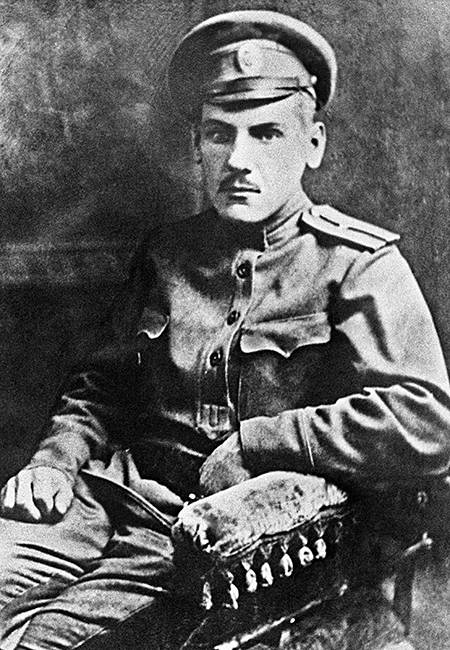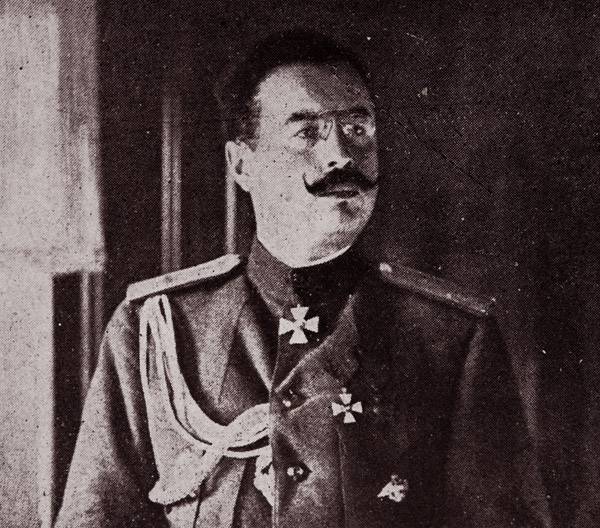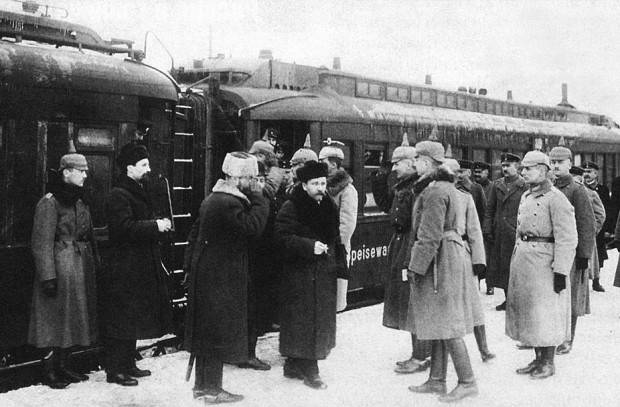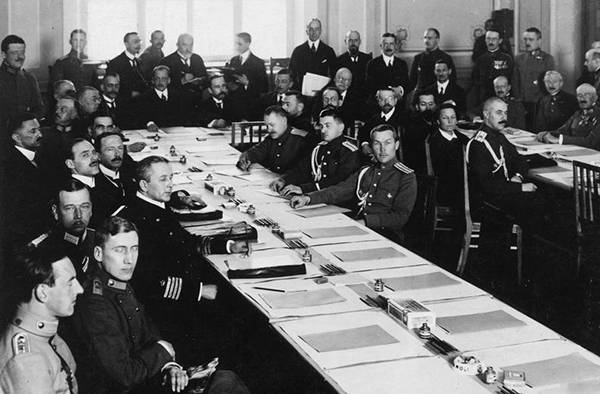How did the war end on the Russian front
The first decree and the first foreign policy act of the Soviet government was the Decree on Peace. The document said: "The workers and peasants' government ... invites all the warring peoples and governments to begin negotiations on a just democratic peace." The decree emphasized that "a just or democratic world ... the government considers an immediate peace without annexations (that is, without seizing foreign lands) and indemnities." The Soviet government declared "the determination to immediately sign the terms of peace, stopping this war on the said, equally fair conditions for all without the removal of nationalities."
The decree was addressed not only to governments, but also to the peoples of the warring countries. At the same time, the Soviet government sent a note to the governments of Great Britain, France, the USA, Italy, Serbia and Belgium, in which it proposed considering the Decree as a formal proposal to conclude an armistice on all fronts and immediately begin peace negotiations. October 28 (November November 10) notes of similar content were sent to the powers of the Fourth Union (Germany, Austria-Hungary, Turkey and Bulgaria) through neutral countries. The governments of the Entente ignored this appeal. “Western democracies” decided to sabotage Russian proposals.
British Prime Minister D. Lloyd George wrote: “The question of whether the Russian revolution will have the same impact as the French, or its influence on the fate of all mankind will be even more, depends on one. This will depend on whether the leaders of the revolution will be able to continue their movement on the paths of peaceful development, or the energy of the revolution will not be spent, and it will be rejected from its goal by the war. If Russia is not involved in the war, then the revolution will be one of the greatest factors determining the fate of the masses in all countries that humankind has ever seen or experienced. ”
Thus, the masters of the West relied on the sewage of revolutionary energy in Russia in a civil war, which they inflamed with all their might, supporting the “white” governments and armies, as well as the nationalists who created their “bantustans” and armies. Also, the Entente went on direct intervention in order to dismember and destroy Russia-Russia and the Russian superethnos.
Actually, the world war was started in order to bleed Germany and Russia, and then destroy the two great powers, which prevent the Anglo-Saxons from establishing their own world order. The masters of the West did everything so that Russia, until the last moment, waged war in their interests and failed to slip out of the deadly trap. In particular, as soon as the threat of a separate peace between Russia and Germany arose, which the pro-German party would like to conclude in Russia, the British secret services immediately removed G. Rasputin, who opposed this war. The Russian empress, the monarchy as a whole, and then the Westernists-Februaryists with the full support of the Western powers destroyed the Russian autocracy, staging the February coup was also discredited.
In addition, the Entente was interested in the preservation of the Russian front due to the military-strategic factor. Even in an extremely weakened form, the Eastern Front still distracted the forces of the German Empire. Even by December 1917, the Russian front was diverting the German divisions to 74 (31% of all German forces). It is clear that Russia's withdrawal from the war allowed the Second Reich to strengthen its positions on the French front. Therefore, the Soviet peace proposals were hushed up.
The Russian Headquarters, headed by Supreme Commander N. N. Dukhonin, was also against the peace agreement. Dukhonin, after Kerensky escaped from Petrograd and the failure of his campaign with Krasnov to the capital, became the commander-in-chief. 7 (20) in November, the Council of People's Commissars (Council of People's Commissars, SNK) instructed Dukhonin to appeal to representatives of the enemy armies with a proposal for an armistice to begin peace talks. However, Duhonin sabotaged this order. On the night of 9 (22) in November, SNK representatives called Dukhonin via direct wire. During telephone conversations, Dukhonin also tried to avoid this topic. When he was ultimately demanded to comply with the instructions of the government, he refused.
Sovnarkom removed Dukhonin from the post of supreme commander. The High Commissioner was appointed Warrant Officer N. V. Krylenko. Before his arrival at Headquarters, Dukhonin had to continue to fulfill his duties. In connection with the sabotage of the generals, Lenin addressed the soldiers directly. In the afternoon of November 9 (22), an appeal for the signature of Lenin and Krylenko to all regimental, divisional, corps, army and other committees, all soldiers and sailors was transmitted by radio. The appeal informed about the refusal of Duhonin to begin negotiations on a truce and his removal from the post of commander in chief. The soldiers were given the right to choose their representatives to enter into a truce with the enemy. This led to the conclusion of the so-called. "Soldier's worlds". Throughout the Eastern Front, separate formations sent parliamentarians to the enemy in order to conclude an armistice. As a result, the conclusion of a local truce took a wide scope. Military operations were stopped everywhere.

Supreme Commander of the Russian Army after the October Revolution 1917, Nikolai Krylenko
Entente opposed the truce. 10 (23) of November, the heads of the Allied missions located in the Russian Headquarters, expressed their protest against the treaty violation of 23 of August (5 of September) 1914. According to this agreement, “the allies, including Russia, solemnly agreed not to conclude a separate truce and not to stop action. From Soviet Russia demanded to fulfill these obligations taken by the tsarist and Provisional governments. The "allies" threatened, promising "the most serious consequences." I.e The Entente still demanded “Russian cannon fodder”, the continuation of the war in the interests of France, England and the USA.
17 (30) in November 1917, when Dukhonin became aware of the movement of echelons with revolutionary Baltic sailors and soldiers to Mogilyov, he appealed to the UNR government for permission to transfer the Headquarters to Kiev. The General Secretariat, however, delayed the consideration of this issue, and began to put forward counter conditions. November 19 (December 2) Dukhonin ordered the release of Generals Kornilov Denikin and other commanders arrested during the Kornilov revolt from Bykhov prison. Dukhonin also ordered the soldiers who had kept him loyalty from the shock units to leave Mogilyov and make their way to the Don, where the formation of the “white” movement began.
November 20 (December 3) 1917. The headquarters was occupied by revolutionary soldiers from Petrograd led by N. Krylenko. Dukhonin was arrested, he should have been taken to Petrograd. A crowd of revolutionary soldiers and sailors gathered around the train, demanding that Dukhonin be handed over. Krylenko arrived at the car and tried to stop the crowd, but persuasion did not work. As a result, the general was the victim of mob. General Denikin wrote in "Outlines of the Russian Distemper": "... a crowd of sailors — wild, angry in front of the Chief Commander, Krylenko tore General Dukhonin and cruelly abused him." The cynical words “send to Dukhonin headquarters” - in the sense of killing without a trial - became winged during the civil war and were used not only “red” but also “white”.

Lieutenant-General Nikolai Dukhonin
The Fourth Union, unlike the Entente countries, went to meet the Soviet government. The protracted war undermined the German economy. The national economy lacked strategic raw materials, and the population lacked food. The industry worked with maximum overvoltage. The population was on the verge of starvation and was tired of a long and bloody war. The Austro-Hungarian Empire was in an even worse position. The weaker Austro-Hungarian economy was on the verge of collapse, the country also experienced a shortage of raw materials and food. On the front, the Austro-Hungarian army held out only with the support of German bayonets. The Habsburg Empire was facing the threat of collapse, the ruling circles understood that the state could not withstand the fourth military campaign. Turkey, which even before the war could not boast of decent finance, industry, agriculture and armed forces, was rapidly falling apart. Her farm was barely functioning, the country was completely devastated. The army lacked combat-ready reinforcements, weapons, ammunition and food. The Allies pressed Turkish forces on the Mesopotamian and Palestinian fronts. In November, the Allies broke through the Ottoman front from Gaza and Beersheba, captured Jaffa, and December 9 occupied Jerusalem.
Thus, the difficult military-strategic and economic situation forced the ruling circles of Germany and Austria-Hungary to negotiate with Russia. Having made peace with Russia, Berlin and Vienna got rid of conducting war on two fronts. They could transfer combat-ready divisions to the Western front, and again make an attempt to make a decisive offensive, even before the march of large American forces. Expressing the general opinion of the ruling circles of Austria-Hungary and Germany, the Austrian Foreign Minister O. Chernin wrote in one of his letters in November 1917 of the year: “For our salvation, peace must be reached as soon as possible; it is unthinkable without the capture of Paris, and for this, again, it is necessary to clear the entire Eastern Front. ” In addition, the world with Russia allowed partially breaking the blockade of Central Europe and somewhat improving the economic situation of the Fourth Union.
13 (26) November 1917 from Dvinsk, the Supreme Commander Krylenko sent parliamentarians to the German High Command in order to find out whether it agreed to start negotiations for a truce. The commander-in-chief of the German Eastern Front, Prince Leopold of Bavaria, agreed to enter into negotiations. Two days later, Chancellor G. Gertling said in the Reichstag that he was ready to enter into negotiations with the Russians. 15 (28) November the Soviet government once again appealed to the warring powers and peoples with a proposal to begin peace negotiations. 17 (30) November The People's Commissariat of Foreign Affairs reiterated a note to the diplomatic representatives of the allied countries, in which it announced the start of negotiations and offered to join them. And this appeal remained unanswered.
November 19 (December 2) to Brest-Litovsk (there was located the German headquarters on the Eastern Front), where they decided to hold talks, the Soviet peace delegation arrived under the chairmanship of A. A. Ioffe. It consisted of G. Ya. Sokolnikov, A. A. Bitsenko, S. D. Maslovsky-Mstislavsky, L. M. Karakhan, etc. The delegation included military consultants and representatives of working people, soldiers and sailors. The German delegation was headed by the Chief of Staff of the Eastern Front, General Hoffmann, the Austro-Hungarian - by Lieutenant Colonel Pokorny, the Bulgarian - by Colonel Ganchev, and the Turkish - by General Zekki.

Hindenburg headquarters officers meet the peace delegation of the Soviet government on the platform of Brest-Litovsk
November 20 (December 3) negotiations began in Brest-Litovsk. The Soviet delegation, at the very first meeting, proposed to the Germans to appeal to the Entente powers to take part in the negotiations for a general truce. General Hoffman, referring to the lack of authority, rejected this proposal. At the November meeting of 21 (December 4), the Soviet delegation announced its draft armistice. It was based on the following points: the cessation of hostilities on all fronts; the demarcation line will run along existing positions; truce is valid for six months; German troops must clear Riga, the Moonsund archipelago; the transfer of troops from the Eastern to the Western Front is prohibited. The German command, however, took a tough stance, refusing to withdraw troops from Riga and from islands in the Baltic Sea, as well as to stop the transfer of troops to France and Belgium that had already begun. Having met the opposition of the Germans, the negotiations were interrupted. However, a provisional agreement was signed on the cessation of hostilities for a period of 10 days - 7 on December 17.
Almost simultaneously, on November 29, the Entente conference began in Paris, at which they discussed what to do now in view of the changed situation in Russia. The allies feared that the Germans, Austrians and Turks could seize large territories in Russia and take advantage of their strategic position and resources. This could worsen the position of the Entente. They discussed the possibility of landing British, French and American landings in Russian ports in order to get ahead of the Germans. 10 (23) December in Paris was concluded first Anglo-French agreement on the division of Russia into "spheres of influence." The allies intended to avoid clashes with the Bolsheviks, whose authorities refused to recognize, but were ready to provide support to all anti-Bolshevik governments and newly-formed countries. The British zone of influence included the Caucasus, the French - Ukraine, Crimea and Bessarabia.
The course of the peace talks with Germany was discussed at a meeting of the CPC, which instructed the delegation in Brest-Litovsk to adhere to the position of the Lenin's "Peace Decree", which proclaimed "an immediate peace without annexations and indemnities". 2 (15 December) negotiations resumed and on the same day ended with the conclusion of a truce between Soviet Russia and the Fourth Alliance. It was installed from 4 (17) December 1917 on 1 (14) January 1918. Contracting parties could terminate the truce by making a warning about this for 7 days. It was also agreed that the Germans would no longer deploy troops from the Eastern Front to the Western. On a huge Russian front, the gun went silent.
The 9 (22) of December in Brest-Litovsk, within the framework of the already reached armistice agreement on the Eastern Front, began negotiations between Germany, Turkey, Bulgaria and Austria-Hungary on the one hand, and Soviet Russia on the other hand on the signing of a peace treaty itself. The delegations headed: from Germany - State Secretary of the Ministry of Foreign Affairs Richard von Kühlmann, from Austria-Hungary - Foreign Minister Ottokar Chernin, from Bulgaria - Justice Minister Hristo Popov, from the Ottoman Empire - Chairman of the Majlis Mehmed Talaat Bey, from Soviet Russia - Adolf Ioffe .
In the same period, Romania emerged from the war. November 26 (December 9) in the city of Focsani, the Romanian government entered into a truce with representatives of the Fourth Union. Because of the beginning of Russia's withdrawal from the war, Romania found itself in an extremely dangerous position. Romania entered the war on the side of the Entente in August 1916, under the guarantee of the Allies for providing assistance and, most importantly, military and material support from Russia. Romania from three sides was surrounded by the allies of Germany: in the south it was bordered by Bulgaria, in the north by Austria-Hungary, in the east by occupied Serbia. Shortly after entering the war, the Romanian army was defeated, most of the country was occupied, and the remaining troops and the Romanian government fled east under the protection of the Russian army that created the Romanian front. With Russian military-material support, the Romanian army was restored and performed well during the 1917 campaign of the year. After the conclusion of a truce between Russia and the German bloc, the Romanian army was one-on-one with three opponents at once, which forced the country's government to begin peace talks.
Soon Russia concluded an armistice with Turkey. 5 (18 December) in the city of Erzincan in eastern Anatolia, the commander-in-chief of the troops of the Russian Caucasian Front, Mikhail, and the leadership of the Transcaucasian Commissariat (a coalition government created in Tiflis) signed an armistice agreement with representatives of the Turkish army. It entered into history as Erzincan truce, which put an end to the war between Russia and the Turkish Empire. At this point, active hostilities were no longer conducted. The Russian army decayed and was in a deplorable state, its supply was almost destroyed. However, the Turks could not lead the offensive. And it was the Turks, taking into account the news of the truce on the Eastern Front and the peace talks in Brest-Litovsk, turned to the Russian command with a proposal for a truce. According to the agreement, hostilities in Asia Minor and Persia were suspended prior to February 12. For the final peace treaty with Russia, the Ottoman Empire sent its delegation to Brest-Litovsk. After that, the spontaneous departure of the Russian troops from the South Caucasus began, and Turkey was given the opportunity to occupy the South Caucasus.
It should be noted that The Soviet government made the only correct step in this situation. In geopolitical, strategic terms, Russia did not need a war with Germany, ideally - Germany was Russia's natural ally against the symbiosis of parasitic clans ruling France, England and the United States (so-called "world backstage", "financial international" "golden elite"). The Russian Empire was set against Germany in order to destroy the two great powers, and without interference, rule the planet, build your world order. The war had to stop and restore normal, good-neighborly relations. The Russians should not have played the role of the "cannon fodder" of the Anglo-Saxons in the fight against Germany.
Militarily, Russia could no longer fight. The armed forces were completely decomposed and lost their combat capability even under the February lists, the Provisional Government. The pro-Western Provisional Government has done everything to decompose, destroy the imperial army, what is left of it. The Russian front has de facto collapsed, the army could not fight. Separate units that retain the ability to fight, did not make the weather. The old army ceased to exist, and the new Red (Soviet) was just beginning to form. Russia could no longer fight. Peace was needed to create a new statehood, a new army, restore the economy, transport and reassure the people.

Delegates of the parties at the consultations in Brest-Litovsk. December 1917 of the year
- Alexander Samsonov
- 1917 Campaign
The transition of the Central Powers to a strategic defense
Entente plans for 1917 year: bet on a decisive victory in the war
Russian army to the beginning of the 1917 campaign of the year: the approach of the general collapse
Attack without shot: Mitav operation
How Germany began the unlimited submarine war
German submarine vs UK
How the German submarine fleet tried to crush the "mistress of the seas"
The United States used the myth of "inhuman" submarine warfare to oppose Germany
Caucasian front in 1917 year. Baratov corps offensive in southwestern Persia
Mosul operation. How the British, until recently, tried to use the Russian "cannon fodder"
The war of the USA and England against Europe and Russia for absolute power on the planet
USA and World War I
How did the USA profit from World War I
"War will end wars." USA in the First World War
World War I turned the United States into a leading world power
"Nivel Meat Grinder"
Tenth Battle of the Isonzo
The failure of the "offensive of Kerensky"
"It was no longer the former Russian"
As Greece at gunpoint forced to go to war
The revival of the Romanian army: the battle of Marashti and Maraseshti
Operation "Albion"
How the Germans stormed the Moonsund Islands
The bloody battle on the plateau Bainzitz
The defeat of the Italian army in the Battle of Caporetto
The defeat of the Italian army in the Battle of Caporetto. H. 2
"To die, but not to retreat!"
As the British offensive under Yprom drowned in mud
The bloody end of the battle of Paschendale
Tank Break under Cambrai
Information